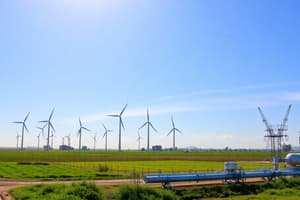Podcast
Questions and Answers
What is a potential environmental impact of extracting natural gas through hydraulic fracturing?
What is a potential environmental impact of extracting natural gas through hydraulic fracturing?
- Reduced water consumption during the extraction process
- Enhanced biodiversity in the affected ecosystems
- Decreased wildlife habitat loss in the area
- Airborne emissions due to venting or flaring (correct)
How do fracking operations generally fare in terms of fugitive emissions according to the text?
How do fracking operations generally fare in terms of fugitive emissions according to the text?
- Above 50%
- Around 10%
- Close to 100%
- Below 1% (correct)
What is a challenge related to wastewater management in natural gas production?
What is a challenge related to wastewater management in natural gas production?
- Large volumes of water required for extraction
- Dependence of treatment efficacy on various factors (correct)
- Absence of briny fluids in natural gas wells
- Easy treatment of wastewater due to advanced technologies
How do natural gas extraction activities impact terrestrial animals and plant life?
How do natural gas extraction activities impact terrestrial animals and plant life?
What is a potential benefit of stewardship efforts in natural gas production?
What is a potential benefit of stewardship efforts in natural gas production?
In the context of natural gas extraction, which of the following is a drawback mentioned in the text?
In the context of natural gas extraction, which of the following is a drawback mentioned in the text?
What is the primary component of natural gas that is a potent greenhouse gas?
What is the primary component of natural gas that is a potent greenhouse gas?
Why is methane considered a significant contributor to climate change?
Why is methane considered a significant contributor to climate change?
Which factor can increase the overall contribution of natural gas towards global warming?
Which factor can increase the overall contribution of natural gas towards global warming?
What do nitrogen oxides (NOₓ) and sulfur dioxide (SO₂) contribute to when released by burning natural gas?
What do nitrogen oxides (NOₓ) and sulfur dioxide (SO₂) contribute to when released by burning natural gas?
How do leaks from pipelines, storage facilities, and drilling sites affect natural gas's environmental impact?
How do leaks from pipelines, storage facilities, and drilling sites affect natural gas's environmental impact?
Which fossil fuels emit more carbon dioxide per unit of energy generated compared to natural gas?
Which fossil fuels emit more carbon dioxide per unit of energy generated compared to natural gas?
Flashcards are hidden until you start studying
Study Notes
Natural Gas: Understanding Its Environmental Impact
Natural gas has played a significant role in meeting our global energy demands since its discovery nearly two centuries ago. As we delve into this vital resource, it's essential to scrutinize its effects on the environment—both positively and negatively. This exploration will shed light on natural gas's environmental footprint across several aspects.
Greenhouse Gas Emissions
With regards to greenhouse gases, natural gas produces fewer emissions per unit of energy generated compared with coal and oil. Methane, the primary component of natural gas, is a potent greenhouse gas; however, when burned, methane converts mostly to carbon dioxide (CO₂), which is still emitted, contributing to climate change, but considerably less so than CO₂ released by fossil fuels like coal and oil.
The precise amount of CO₂ produced during natural gas combustion varies depending upon factors such as the efficiency of extraction methods, and whether leakage occurs within the supply chain. For instance, leaks from pipelines, storage facilities, drilling sites, and other equipment can result in substantial amounts of methane escaping unburned into the atmosphere. If neglected, these escapes increase the overall contribution of natural gas towards global warming.
Air Pollution
Burning natural gas releases nitrogen oxides (NOₓ) and sulfur dioxide (SO₂), which contribute to air pollution and acid rain. However, both pollutants occur at much lower levels relative to burning coal, resulting in improved local air quality where natural gas replaces more pollutive fuel sources.
When extracted via hydraulic fracturing ("fracking"), airborne emissions may arise due to venting or flaring—the intentional release of natural gas into the atmosphere without capturing it for later use. In areas with strict emission regulations, fracking operations have shown relatively low rates of fugitive emissions, typically below 1%.
Water Usage and Wastewater Generation
Water consumption and wastewater discharge are also considerations related to natural gas production. Hydraulic fracturing requires large volumes of water, though this usage represents only a tiny fraction of total freshwater withdrawals globally. Additionally, some natural gas wells produce briny fluids, characterized as wastewater, known as flowback or produced water. While treatment technologies exist to process this fluid, their efficacy depends upon regulatory frameworks, industry practices, and geographical locations.
Land Disturbance and Wildlife Habitat Loss
Extracting natural gas results in surface disturbances such as access roads, drill pads, and pipelines, leading to habitat fragmentation for terrestrial animals and plant life. To mitigate these impacts, stewardship efforts aim to minimize and restore affected ecosystems through strategies such as pipeline easements and land reclamation after drilling activities cease. Reclamation techniques range from simple grass seeding to sophisticated engineered solutions designed to promote native species recovery.
In conclusion, natural gas presents itself as a cleaner alternative to conventional petroleum fuels, offering benefits regarding reduced greenhouse gas emissions, less air pollution, and potential wildlife conservation measures. Nonetheless, unavoidable drawbacks persist, including concerns about water scarcity, wastewater management, and gas leakages along the entire value chain. Mitigation measures to address these issues offer promise for reducing negative consequences while maintaining the positive attributes of natural gas in the world's transition toward sustainable energy systems.
Studying That Suits You
Use AI to generate personalized quizzes and flashcards to suit your learning preferences.



